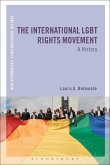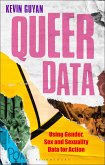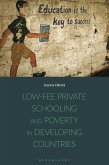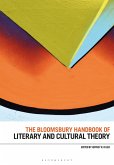The Bloomsbury Handbook of Gender and Educational Leadership and Management
Herausgeber: Showunmi, Associate Victoria; Oplatka, Izhar; Shakeshaft, Charol; Moorosi, Pontso
The Bloomsbury Handbook of Gender and Educational Leadership and Management
Herausgeber: Showunmi, Associate Victoria; Oplatka, Izhar; Shakeshaft, Charol; Moorosi, Pontso
- Gebundenes Buch
- Merkliste
- Auf die Merkliste
- Bewerten Bewerten
- Teilen
- Produkt teilen
- Produkterinnerung
- Produkterinnerung
"Drawing together diverse research perspectives and theoretical underpinnings, this handbook explores gender as a social category and examines cultural and social differences. Bringing together diverse perspectives from around the world, including from Africa, Europe, the Middle East, the UK and the USA, the volume sets out the gender and educational leadership and management field, providing a snapshot of the field as it stands, signalling its development and directions for future development. It offers focused reviews of empirical research on particular aspects of the field and presents new…mehr
Andere Kunden interessierten sich auch für
![The International LGBT Rights Movement The International LGBT Rights Movement]() Professor Laura A. Belmonte (USA Oklahoma State University)The International LGBT Rights Movement33,99 €
Professor Laura A. Belmonte (USA Oklahoma State University)The International LGBT Rights Movement33,99 €![Queer Data Queer Data]() Kevin Guyan (UK University of Edinburgh)Queer Data18,99 €
Kevin Guyan (UK University of Edinburgh)Queer Data18,99 €![Low-fee Private Schooling and Poverty in Developing Countries Low-fee Private Schooling and Poverty in Developing Countries]() Joanna Harma (UK University of Sussex)Low-fee Private Schooling and Poverty in Developing Countries80,99 €
Joanna Harma (UK University of Sussex)Low-fee Private Schooling and Poverty in Developing Countries80,99 €![Educating for Peace and Human Rights Educating for Peace and Human Rights]() Maria Hantzopoulos (USA Vassar College)Educating for Peace and Human Rights42,99 €
Maria Hantzopoulos (USA Vassar College)Educating for Peace and Human Rights42,99 €![The Bloomsbury Handbook of 21st-Century Feminist Theory The Bloomsbury Handbook of 21st-Century Feminist Theory]() The Bloomsbury Handbook of 21st-Century Feminist Theory44,99 €
The Bloomsbury Handbook of 21st-Century Feminist Theory44,99 €![The Bloomsbury Handbook of Literary and Cultural Theory The Bloomsbury Handbook of Literary and Cultural Theory]() The Bloomsbury Handbook of Literary and Cultural Theory42,99 €
The Bloomsbury Handbook of Literary and Cultural Theory42,99 €![Climate Change in Human History Climate Change in Human History]() Benjamin Lieberman (USA Fitchburg State University)Climate Change in Human History19,99 €
Benjamin Lieberman (USA Fitchburg State University)Climate Change in Human History19,99 €-
-
-
"Drawing together diverse research perspectives and theoretical underpinnings, this handbook explores gender as a social category and examines cultural and social differences. Bringing together diverse perspectives from around the world, including from Africa, Europe, the Middle East, the UK and the USA, the volume sets out the gender and educational leadership and management field, providing a snapshot of the field as it stands, signalling its development and directions for future development. It offers focused reviews of empirical research on particular aspects of the field and presents new insights from research findings and methodological approaches"--
Produktdetails
- Produktdetails
- Bloomsbury Handbooks
- Verlag: Bloomsbury Publishing PLC
- Seitenzahl: 432
- Erscheinungstermin: 24. Februar 2022
- Englisch
- Abmessung: 177mm x 253mm x 33mm
- Gewicht: 902g
- ISBN-13: 9781350173156
- ISBN-10: 1350173150
- Artikelnr.: 62050913
- Herstellerkennzeichnung
- Libri GmbH
- Europaallee 1
- 36244 Bad Hersfeld
- gpsr@libri.de
- Bloomsbury Handbooks
- Verlag: Bloomsbury Publishing PLC
- Seitenzahl: 432
- Erscheinungstermin: 24. Februar 2022
- Englisch
- Abmessung: 177mm x 253mm x 33mm
- Gewicht: 902g
- ISBN-13: 9781350173156
- ISBN-10: 1350173150
- Artikelnr.: 62050913
- Herstellerkennzeichnung
- Libri GmbH
- Europaallee 1
- 36244 Bad Hersfeld
- gpsr@libri.de
Victoria Showunmi is Lecturer in Education at IOE, UCL's Faculty of Education and Society, University College London, UK, Affiliated Faculty at the University of North Carolina, USA, and Visiting Associate Professor at Fulda University of Applied Sciences, Germany. Pontso Moorosi is Associate Professor of Educational Leadership and Management at the University of Warwick, UK, and Research Associate at the University of Johannesburg, South Africa. Charol Shakeshaft is Professor of Educational Leadership in the School of Education at Virginia Commonwealth University, USA. Izhar Oplatka is Professor of Educational Administration and Leadership in the School of Education at Tel Aviv University, Israel.
List of Illustrations
List of Contributors
Acknowledgements
Foreword, Helen M. Gunter (University of Manchester, UK)
Introduction Victoria Showunmi (UCL Institute of Education, University
College London, UK) and Pontso Moorosi (University of Warwick, UK)
PART I: Understanding Gender and Educational Leadership
Part I Introduction, Victoria Showunmi (UCL Institute of Education,
University College London, UK)
1. Reflections on the Social Relations of Gender and Educational Leadership
and Practice: the Case of Australia, Jill Blackmore (Deakin University,
Australia)
2. Reframing Constructive Spaces for Women in Educational Leadership: A
Transatlantic Study, Maureen K. Porter and Claudia Fahrenwald (University
of Education Upper Austria, Germany)
3. Women Publishing on South African Educational Leadership Research: A
Gender(ed) Topographical Literature Analysis, Janine Le Roux and Juliet
Perumal (University of Johannesburg, South Africa)
4. Gender, Leadership, and Positional Power, Saeeda Shah (Pakistan and the
UK)
5. The Soul Work of a Womanist Ethical Critical Servant Leader: An
Authentic and Delicate Balance, Judy A. Alston (Ashland University, USA)
PART II: Intersectionality and Social Justice
Part II Introduction, Victoria Showunmi (UCL Institute of Education,
University College London, UK)
6. Social In/Justice and Double Marginality in Educational Leadership:
Trajectories of Three Female School Principals from the Middle East,
Khalid Arar (Texas State University, USA), Deniz Orucu (Baskent University,
Turkey) and Julia Muhfouz (University of Colorado, Denver, USA)
7. Gender, Educational Leadership and Social Justice: An Intersectional
Lens, Jane Wilkinson (Monash University, Australia) and Katrina MacDonald
(Deakin University, Australia)
8. Intersectionality and Social Justice: Knowing Intersectional
Discrimination When You Feel It, Kay Fuller (University of Nottingham, UK)
9. Disrupting Narratives of Women in Educational Leadership, Rosemary
Campbell-Stephens (Caribbean)
10. Developing Leadership Acts: A Way to Reclaim Power Which Can Harness
Actions and Resources, Sigal Oppenheimer (Bar-Ilan University, Israel)
11. Black Women Headteachers of the Windrush Generation, Lauri Johnson
(Boston College, USA)
12. Intersectionality or Double Difference: Learning and Leading with Deaf
Black Women in Brazil, Laudilea Aparecida de Lourdes Laudino (Rio de
Janeiro County (PMRJ), Brazil) and Rosangela Malachias (Rio de Janeiro
University, Brazil)
Part III: Gender and Women's Ways of Leading
Part III Introduction, Charol Shakeshaft (Virginia Commonwealth University,
USA)
13. Black Women's Leadership Skills and Practices, Portia Newman
(University of Virginia, USA)
14. Mastering the Art of Fixing Ethical Dilemmas: Women Leading Schools in
India, N. Mythili (National Institute of Educational Planning and
Administration, India)
15. Promoting a Gender-Sensitive Learning Environment among Primary and
Secondary School Leaders in Zimbabwe, Irene Muzvidziwai (Midlands State
University, Zimbabwe)
16. Women's Way of Leading: Inappropriate Essentialism or Critical
Question?, Jacky Lumby (University of Southampton, UK)
Part IV: Gender, Career and Leadership Development
Part IV Introduction, Pontso Moorosi (University of Warwick, UK)
17. Gender and Career: Constraints and Facilitators for Women in Accessing
Educational Leadership in the UK, Marianne Coleman (UCL Institute of
Education, University College London, UK)
18. National and District Support for Women Aspiring to Careers in School
Leadership in Ethiopia, Turuward Zalalam Warkineh, Tizita Lemma Melka
(Bahir Dar University, Ethiopia) and Jill Sperandio (LeHigh University,
USA)
19. Leading Post-Primary Education for STEM Careers: The Gendered
Perspectives in an Irish Context, Mary Cuneen (University College Dublin,
Ireland)
20. Women in Educational Leadership in Afghanistan, Costa Rica and Rwanda:
Reifying Socio-cultural Capital, Elizabeth C. Reilly (Loyola Marymount
University, USA)
21. Women of Colour Creating Careers as Superintendents of US School
Districts, Angel Miles Nash and Margaret Grogan (Chapman University, USA)
Part V: Emotional Well-Being of Educational Leaders
Part V Introduction, Izhar Oplatka (Tel Aviv University, Israel)
22. The Missing Statistic in Initial Teacher Education: Experiences and
Support Needs of Student Teachers who are Mothers, Joan Woodhouse and Laura
Guihen (University of Leicester, UK)
23. An Insight into the Professional Journey of Pakistani Women Academics:
A Case from Pakistan, Afifa Khanam, Asma Kazi, Fakhra Aziz, Saira Taj,
Aishah Siddiqah, Uzma Quraishi (Lahore College for Women University,
Pakistan) and Victoria Showunmi (UCL Institute of Education, University
College London, UK)
24. Women's Educational Leadership and the (not so) Hidden Toll of
Emotional Labour: The Vomit in My Handbag, Rachel McNae (University of
Waikato, New Zealand)
25. Black Academic Invisibility: Intersectionality, Resiliency and the
Complexity of Being Seen, Mary F. Howard Hamilton, Kandace G. Hinton and
Kelsey Bogard (Indiana State University, USA)
References
Index
List of Contributors
Acknowledgements
Foreword, Helen M. Gunter (University of Manchester, UK)
Introduction Victoria Showunmi (UCL Institute of Education, University
College London, UK) and Pontso Moorosi (University of Warwick, UK)
PART I: Understanding Gender and Educational Leadership
Part I Introduction, Victoria Showunmi (UCL Institute of Education,
University College London, UK)
1. Reflections on the Social Relations of Gender and Educational Leadership
and Practice: the Case of Australia, Jill Blackmore (Deakin University,
Australia)
2. Reframing Constructive Spaces for Women in Educational Leadership: A
Transatlantic Study, Maureen K. Porter and Claudia Fahrenwald (University
of Education Upper Austria, Germany)
3. Women Publishing on South African Educational Leadership Research: A
Gender(ed) Topographical Literature Analysis, Janine Le Roux and Juliet
Perumal (University of Johannesburg, South Africa)
4. Gender, Leadership, and Positional Power, Saeeda Shah (Pakistan and the
UK)
5. The Soul Work of a Womanist Ethical Critical Servant Leader: An
Authentic and Delicate Balance, Judy A. Alston (Ashland University, USA)
PART II: Intersectionality and Social Justice
Part II Introduction, Victoria Showunmi (UCL Institute of Education,
University College London, UK)
6. Social In/Justice and Double Marginality in Educational Leadership:
Trajectories of Three Female School Principals from the Middle East,
Khalid Arar (Texas State University, USA), Deniz Orucu (Baskent University,
Turkey) and Julia Muhfouz (University of Colorado, Denver, USA)
7. Gender, Educational Leadership and Social Justice: An Intersectional
Lens, Jane Wilkinson (Monash University, Australia) and Katrina MacDonald
(Deakin University, Australia)
8. Intersectionality and Social Justice: Knowing Intersectional
Discrimination When You Feel It, Kay Fuller (University of Nottingham, UK)
9. Disrupting Narratives of Women in Educational Leadership, Rosemary
Campbell-Stephens (Caribbean)
10. Developing Leadership Acts: A Way to Reclaim Power Which Can Harness
Actions and Resources, Sigal Oppenheimer (Bar-Ilan University, Israel)
11. Black Women Headteachers of the Windrush Generation, Lauri Johnson
(Boston College, USA)
12. Intersectionality or Double Difference: Learning and Leading with Deaf
Black Women in Brazil, Laudilea Aparecida de Lourdes Laudino (Rio de
Janeiro County (PMRJ), Brazil) and Rosangela Malachias (Rio de Janeiro
University, Brazil)
Part III: Gender and Women's Ways of Leading
Part III Introduction, Charol Shakeshaft (Virginia Commonwealth University,
USA)
13. Black Women's Leadership Skills and Practices, Portia Newman
(University of Virginia, USA)
14. Mastering the Art of Fixing Ethical Dilemmas: Women Leading Schools in
India, N. Mythili (National Institute of Educational Planning and
Administration, India)
15. Promoting a Gender-Sensitive Learning Environment among Primary and
Secondary School Leaders in Zimbabwe, Irene Muzvidziwai (Midlands State
University, Zimbabwe)
16. Women's Way of Leading: Inappropriate Essentialism or Critical
Question?, Jacky Lumby (University of Southampton, UK)
Part IV: Gender, Career and Leadership Development
Part IV Introduction, Pontso Moorosi (University of Warwick, UK)
17. Gender and Career: Constraints and Facilitators for Women in Accessing
Educational Leadership in the UK, Marianne Coleman (UCL Institute of
Education, University College London, UK)
18. National and District Support for Women Aspiring to Careers in School
Leadership in Ethiopia, Turuward Zalalam Warkineh, Tizita Lemma Melka
(Bahir Dar University, Ethiopia) and Jill Sperandio (LeHigh University,
USA)
19. Leading Post-Primary Education for STEM Careers: The Gendered
Perspectives in an Irish Context, Mary Cuneen (University College Dublin,
Ireland)
20. Women in Educational Leadership in Afghanistan, Costa Rica and Rwanda:
Reifying Socio-cultural Capital, Elizabeth C. Reilly (Loyola Marymount
University, USA)
21. Women of Colour Creating Careers as Superintendents of US School
Districts, Angel Miles Nash and Margaret Grogan (Chapman University, USA)
Part V: Emotional Well-Being of Educational Leaders
Part V Introduction, Izhar Oplatka (Tel Aviv University, Israel)
22. The Missing Statistic in Initial Teacher Education: Experiences and
Support Needs of Student Teachers who are Mothers, Joan Woodhouse and Laura
Guihen (University of Leicester, UK)
23. An Insight into the Professional Journey of Pakistani Women Academics:
A Case from Pakistan, Afifa Khanam, Asma Kazi, Fakhra Aziz, Saira Taj,
Aishah Siddiqah, Uzma Quraishi (Lahore College for Women University,
Pakistan) and Victoria Showunmi (UCL Institute of Education, University
College London, UK)
24. Women's Educational Leadership and the (not so) Hidden Toll of
Emotional Labour: The Vomit in My Handbag, Rachel McNae (University of
Waikato, New Zealand)
25. Black Academic Invisibility: Intersectionality, Resiliency and the
Complexity of Being Seen, Mary F. Howard Hamilton, Kandace G. Hinton and
Kelsey Bogard (Indiana State University, USA)
References
Index
List of Illustrations
List of Contributors
Acknowledgements
Foreword, Helen M. Gunter (University of Manchester, UK)
Introduction Victoria Showunmi (UCL Institute of Education, University
College London, UK) and Pontso Moorosi (University of Warwick, UK)
PART I: Understanding Gender and Educational Leadership
Part I Introduction, Victoria Showunmi (UCL Institute of Education,
University College London, UK)
1. Reflections on the Social Relations of Gender and Educational Leadership
and Practice: the Case of Australia, Jill Blackmore (Deakin University,
Australia)
2. Reframing Constructive Spaces for Women in Educational Leadership: A
Transatlantic Study, Maureen K. Porter and Claudia Fahrenwald (University
of Education Upper Austria, Germany)
3. Women Publishing on South African Educational Leadership Research: A
Gender(ed) Topographical Literature Analysis, Janine Le Roux and Juliet
Perumal (University of Johannesburg, South Africa)
4. Gender, Leadership, and Positional Power, Saeeda Shah (Pakistan and the
UK)
5. The Soul Work of a Womanist Ethical Critical Servant Leader: An
Authentic and Delicate Balance, Judy A. Alston (Ashland University, USA)
PART II: Intersectionality and Social Justice
Part II Introduction, Victoria Showunmi (UCL Institute of Education,
University College London, UK)
6. Social In/Justice and Double Marginality in Educational Leadership:
Trajectories of Three Female School Principals from the Middle East,
Khalid Arar (Texas State University, USA), Deniz Orucu (Baskent University,
Turkey) and Julia Muhfouz (University of Colorado, Denver, USA)
7. Gender, Educational Leadership and Social Justice: An Intersectional
Lens, Jane Wilkinson (Monash University, Australia) and Katrina MacDonald
(Deakin University, Australia)
8. Intersectionality and Social Justice: Knowing Intersectional
Discrimination When You Feel It, Kay Fuller (University of Nottingham, UK)
9. Disrupting Narratives of Women in Educational Leadership, Rosemary
Campbell-Stephens (Caribbean)
10. Developing Leadership Acts: A Way to Reclaim Power Which Can Harness
Actions and Resources, Sigal Oppenheimer (Bar-Ilan University, Israel)
11. Black Women Headteachers of the Windrush Generation, Lauri Johnson
(Boston College, USA)
12. Intersectionality or Double Difference: Learning and Leading with Deaf
Black Women in Brazil, Laudilea Aparecida de Lourdes Laudino (Rio de
Janeiro County (PMRJ), Brazil) and Rosangela Malachias (Rio de Janeiro
University, Brazil)
Part III: Gender and Women's Ways of Leading
Part III Introduction, Charol Shakeshaft (Virginia Commonwealth University,
USA)
13. Black Women's Leadership Skills and Practices, Portia Newman
(University of Virginia, USA)
14. Mastering the Art of Fixing Ethical Dilemmas: Women Leading Schools in
India, N. Mythili (National Institute of Educational Planning and
Administration, India)
15. Promoting a Gender-Sensitive Learning Environment among Primary and
Secondary School Leaders in Zimbabwe, Irene Muzvidziwai (Midlands State
University, Zimbabwe)
16. Women's Way of Leading: Inappropriate Essentialism or Critical
Question?, Jacky Lumby (University of Southampton, UK)
Part IV: Gender, Career and Leadership Development
Part IV Introduction, Pontso Moorosi (University of Warwick, UK)
17. Gender and Career: Constraints and Facilitators for Women in Accessing
Educational Leadership in the UK, Marianne Coleman (UCL Institute of
Education, University College London, UK)
18. National and District Support for Women Aspiring to Careers in School
Leadership in Ethiopia, Turuward Zalalam Warkineh, Tizita Lemma Melka
(Bahir Dar University, Ethiopia) and Jill Sperandio (LeHigh University,
USA)
19. Leading Post-Primary Education for STEM Careers: The Gendered
Perspectives in an Irish Context, Mary Cuneen (University College Dublin,
Ireland)
20. Women in Educational Leadership in Afghanistan, Costa Rica and Rwanda:
Reifying Socio-cultural Capital, Elizabeth C. Reilly (Loyola Marymount
University, USA)
21. Women of Colour Creating Careers as Superintendents of US School
Districts, Angel Miles Nash and Margaret Grogan (Chapman University, USA)
Part V: Emotional Well-Being of Educational Leaders
Part V Introduction, Izhar Oplatka (Tel Aviv University, Israel)
22. The Missing Statistic in Initial Teacher Education: Experiences and
Support Needs of Student Teachers who are Mothers, Joan Woodhouse and Laura
Guihen (University of Leicester, UK)
23. An Insight into the Professional Journey of Pakistani Women Academics:
A Case from Pakistan, Afifa Khanam, Asma Kazi, Fakhra Aziz, Saira Taj,
Aishah Siddiqah, Uzma Quraishi (Lahore College for Women University,
Pakistan) and Victoria Showunmi (UCL Institute of Education, University
College London, UK)
24. Women's Educational Leadership and the (not so) Hidden Toll of
Emotional Labour: The Vomit in My Handbag, Rachel McNae (University of
Waikato, New Zealand)
25. Black Academic Invisibility: Intersectionality, Resiliency and the
Complexity of Being Seen, Mary F. Howard Hamilton, Kandace G. Hinton and
Kelsey Bogard (Indiana State University, USA)
References
Index
List of Contributors
Acknowledgements
Foreword, Helen M. Gunter (University of Manchester, UK)
Introduction Victoria Showunmi (UCL Institute of Education, University
College London, UK) and Pontso Moorosi (University of Warwick, UK)
PART I: Understanding Gender and Educational Leadership
Part I Introduction, Victoria Showunmi (UCL Institute of Education,
University College London, UK)
1. Reflections on the Social Relations of Gender and Educational Leadership
and Practice: the Case of Australia, Jill Blackmore (Deakin University,
Australia)
2. Reframing Constructive Spaces for Women in Educational Leadership: A
Transatlantic Study, Maureen K. Porter and Claudia Fahrenwald (University
of Education Upper Austria, Germany)
3. Women Publishing on South African Educational Leadership Research: A
Gender(ed) Topographical Literature Analysis, Janine Le Roux and Juliet
Perumal (University of Johannesburg, South Africa)
4. Gender, Leadership, and Positional Power, Saeeda Shah (Pakistan and the
UK)
5. The Soul Work of a Womanist Ethical Critical Servant Leader: An
Authentic and Delicate Balance, Judy A. Alston (Ashland University, USA)
PART II: Intersectionality and Social Justice
Part II Introduction, Victoria Showunmi (UCL Institute of Education,
University College London, UK)
6. Social In/Justice and Double Marginality in Educational Leadership:
Trajectories of Three Female School Principals from the Middle East,
Khalid Arar (Texas State University, USA), Deniz Orucu (Baskent University,
Turkey) and Julia Muhfouz (University of Colorado, Denver, USA)
7. Gender, Educational Leadership and Social Justice: An Intersectional
Lens, Jane Wilkinson (Monash University, Australia) and Katrina MacDonald
(Deakin University, Australia)
8. Intersectionality and Social Justice: Knowing Intersectional
Discrimination When You Feel It, Kay Fuller (University of Nottingham, UK)
9. Disrupting Narratives of Women in Educational Leadership, Rosemary
Campbell-Stephens (Caribbean)
10. Developing Leadership Acts: A Way to Reclaim Power Which Can Harness
Actions and Resources, Sigal Oppenheimer (Bar-Ilan University, Israel)
11. Black Women Headteachers of the Windrush Generation, Lauri Johnson
(Boston College, USA)
12. Intersectionality or Double Difference: Learning and Leading with Deaf
Black Women in Brazil, Laudilea Aparecida de Lourdes Laudino (Rio de
Janeiro County (PMRJ), Brazil) and Rosangela Malachias (Rio de Janeiro
University, Brazil)
Part III: Gender and Women's Ways of Leading
Part III Introduction, Charol Shakeshaft (Virginia Commonwealth University,
USA)
13. Black Women's Leadership Skills and Practices, Portia Newman
(University of Virginia, USA)
14. Mastering the Art of Fixing Ethical Dilemmas: Women Leading Schools in
India, N. Mythili (National Institute of Educational Planning and
Administration, India)
15. Promoting a Gender-Sensitive Learning Environment among Primary and
Secondary School Leaders in Zimbabwe, Irene Muzvidziwai (Midlands State
University, Zimbabwe)
16. Women's Way of Leading: Inappropriate Essentialism or Critical
Question?, Jacky Lumby (University of Southampton, UK)
Part IV: Gender, Career and Leadership Development
Part IV Introduction, Pontso Moorosi (University of Warwick, UK)
17. Gender and Career: Constraints and Facilitators for Women in Accessing
Educational Leadership in the UK, Marianne Coleman (UCL Institute of
Education, University College London, UK)
18. National and District Support for Women Aspiring to Careers in School
Leadership in Ethiopia, Turuward Zalalam Warkineh, Tizita Lemma Melka
(Bahir Dar University, Ethiopia) and Jill Sperandio (LeHigh University,
USA)
19. Leading Post-Primary Education for STEM Careers: The Gendered
Perspectives in an Irish Context, Mary Cuneen (University College Dublin,
Ireland)
20. Women in Educational Leadership in Afghanistan, Costa Rica and Rwanda:
Reifying Socio-cultural Capital, Elizabeth C. Reilly (Loyola Marymount
University, USA)
21. Women of Colour Creating Careers as Superintendents of US School
Districts, Angel Miles Nash and Margaret Grogan (Chapman University, USA)
Part V: Emotional Well-Being of Educational Leaders
Part V Introduction, Izhar Oplatka (Tel Aviv University, Israel)
22. The Missing Statistic in Initial Teacher Education: Experiences and
Support Needs of Student Teachers who are Mothers, Joan Woodhouse and Laura
Guihen (University of Leicester, UK)
23. An Insight into the Professional Journey of Pakistani Women Academics:
A Case from Pakistan, Afifa Khanam, Asma Kazi, Fakhra Aziz, Saira Taj,
Aishah Siddiqah, Uzma Quraishi (Lahore College for Women University,
Pakistan) and Victoria Showunmi (UCL Institute of Education, University
College London, UK)
24. Women's Educational Leadership and the (not so) Hidden Toll of
Emotional Labour: The Vomit in My Handbag, Rachel McNae (University of
Waikato, New Zealand)
25. Black Academic Invisibility: Intersectionality, Resiliency and the
Complexity of Being Seen, Mary F. Howard Hamilton, Kandace G. Hinton and
Kelsey Bogard (Indiana State University, USA)
References
Index








